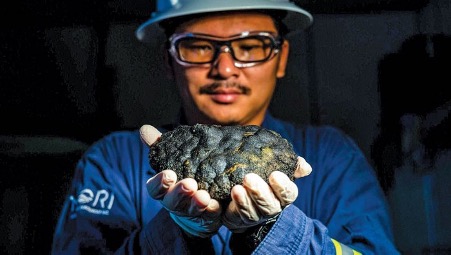Experts and academics are invited to join a new science network that will help to provide evidence on the environmental impact of deep-sea mining.
The UK Government has launched a new UK-based environmental science network, to gather scientific data, and carry out world-class research to help assess the environmental impacts of deep-sea mining.
Eligible applicants can now apply to join the network and share their expertise to help fill in the current evidence gaps in understanding the consequences of deep-sea mining on our ecosystems. Bringing together the UK’s environmental science expertise to share internationally will help the UK ensure that the highest environmental standards are enforced on deep sea mining.
 Photo credit: The Metals Company
Photo credit: The Metals Company
The network will work alongside the UK’s recent decision to support a moratorium on the granting of exploitation licences for deep sea mining projects by the International Seabed Authority (ISA).
The moratorium means the UK will not sponsor or support licences until sufficient scientific evidence is available to assess the impacts of deep-sea mining activities on marine ecosystems and strong, enforceable environmental regulations, standards and guidelines have been developed and adopted by the ISA.
Inevitability of deep-sea mining
Meanwhile, Michael Lodge, secretary-general of the International Seabed Authority, the U.N. regulator that oversees deep-sea mining, told CNBC that global interest in deep-sea mining has climbed to levels not seen since the 1970s, with advocates clearly excited by the industry’s potential role in the energy transition.
“One of the main drivers of industrial interest is the potential to produce larger quantities of minerals at equivalent or lower cost to what can be produced on land,” Lodge told CNBC via videoconference.
When asked whether it was now likely a matter of time before countries begin deep-sea mining, ISA’s Lodge replied, “Clearly now, we are reaching a very high level of interest so I would say that yes it seems to be inevitable.”
“Whether that takes place in international waters, or in national waters, whether that be Norway or another country, that’s impossible to say,” he added. “It depends in part upon the terms and conditions I suppose.”
Harnessing the skills of the UK science community
Those involved in the new network have welcomed the initiative:
Marine Minister Lord Benyon said: “The UK is committed to protecting the world’s ocean and improving the conservation of our marine ecosystems, so it’s important that we ensure the best environmental standards are in place so damaging activities like deep-sea mining are strongly regulated.
This new network is a further step in showing how we can use the scientific expertise that is on offer to protect and improve the conservation of our marine biodiversity.”
Professor Daniel Jones from National Oceanography Centre said: “The new DSM Environmental Science Network is an excellent way to harness the skills of the UK community with expertise on environments of interest for deep-sea mining. It will enable the very active research being carried out by UK scientists to be communicated quickly and effectively to the government to support evidence-based decision making on this topic.”
Dr. Adrian Glover, Merit Researcher at the Natural History Museum, said: “In joining the environmental science network, we are pleased to continue our research on the deep-sea to provide free, critical biodiversity data to everyone. At this crucial time in our planet’s history, it is important all activities that impact the natural world are informed by robust, evidence-based science.”
Potential applicants can find further information and apply here.